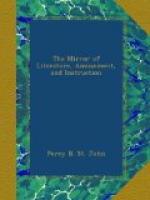R.—I once was witness to an instance of apathy on the part of a father—your talking of duelling reminds me of it—which is perhaps without a parallel. Walking one day beyond the Barriere de Clichy, I saw several persons assembled at a little distance from the roadside. Two gentlemen had just taken their ground—you know that these affairs are not always conducted with the same privacy on the Continent as in England—and received their pistols from the hands of their seconds. They fired at the same instant. One of the combatants, a line young man of about five-and-twenty, received his adversary’s shot in his forehead: it pierced his brain. He sprang nearly his own height from the ground, and fell dead. He was immediately carried home to his father’s house, which was at no great distance from the spot, and I went along with the crowd. He was an only son, mind you, but (so it was said) a mauvais sujet of the last degree—indeed the very quarrel which led to the duel had occurred in a gaming-house of which he was a regular frequenter. The body, which I followed into the courtyard of his father’s house, was placed on the stones. The father was sent for;—a scene was naturally to be expected;—and a scene to be remembered there was. The old gentleman came out, looked calmly upon the dead body of his son, deliberately took a pinch of snuff, tapped down the lid of the box, and, saying nothing in the world more than—Enfin!—walked in again.
S.—Pere Sensible!
Ibid.
* * * * *
POLITICAL CHANGES.
Presumptuous was the wish so patriotically conceived, and so repeatedly extolled, of that pious churchman, who exclaimed, with reference to the constitution of his native country, now no more existing as an independent state, “Esto perpetua!” The ancients, indeed, to secure what might be humanely termed a perpetuity to their laws and edicts, had them graven on brass. But what is the perpetuity even of brass itself, when opposed to the irresistible advance of Time? Even in the very infancy of the world, this question might have been answered, as it was, some few thousand years after its creation, by Old Simonides:
“Who so bold
To uphold
What the Lindian sage[16] has told?
Who will dare
To compare
Works of man, that fleeting are,
With the smooth perennial flow
Of swift rivers, or the glow
Of the eternal sun, or light
Of the golden orb of night?
Spring renews
The floweret’s hues
With his sweet refreshing dews;
Ocean wide
Bids his tide
With returning current glide;
The sculptured tomb is but a toy
Man may fashion, man destroy—
Eternity in stone or brass?
Go, go! who said it was an ass.”
Fragm. 10. BRUNCK, _ Analect_, tom. i. p. 122.
[16] Cleobulus.




